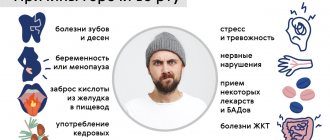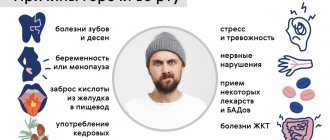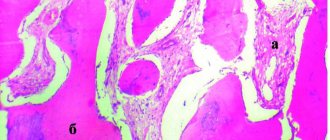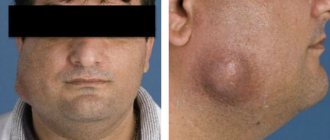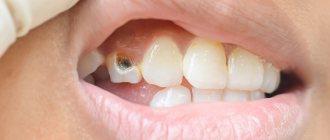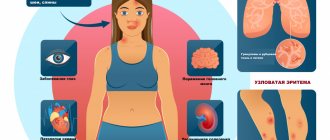Where does the bitter taste come from?
An unpleasant taste may be present constantly or appear periodically. This symptom is associated with the release of bile into the esophagus. Patients often notice a bitter taste in the mouth in the morning, especially when eating fatty foods the day before and after sleeping on the left side.
Bile is a liver secretion that is involved in digestion. The fluid flows through the ducts into the gallbladder and from there into the duodenum. Normally, bile does not flow into the esophagus, and the person feels well.
After eating certain types of food, the liver may react by producing more secretions. The volume of bile in the intestines increases, and a small part enters the esophagus, causing a bitter taste in the mouth. The same reaction occurs when using certain medications or when exposed to other factors. In any case, an unpleasant taste is a reason to consult a doctor. Only by identifying the cause of bitterness in the mouth can a person’s well-being be improved.
Gastroesophageal reflux disease
It is also called acid reflux. This is a disease caused by the reflux of gastric contents into the esophagus. This causes irritation and a bitter taste. If your stomach hurts and there is a bitter taste in your mouth, then most likely this is due to this disease. This disease appears from consuming large amounts of fatty, spicy, harmful foods. In addition to bitterness, hiccups, heartburn, belching and bloating appear in the mouth.
To eliminate acid reflux, you need to avoid spicy and fatty foods, as well as citrus fruits and chocolate, in your diet. Light physical exercise will be useful - gymnastics, jogging. Regarding drug treatment, you should consult a gastroenterologist.
Possible causes of bitterness in the mouth
Diseases of the biliary tract
Bile transport in the body is disrupted in chronic cholecystitis, cholelithiasis, biliary dyskinesia, hepatitis, and cirrhosis. Spasm or blockage of the duct leads to stagnation of secretions.
Important!
Bitterness in the mouth after eating can occur even after removal of the gallbladder. The reason is that bile is constantly produced in the body, and if a person does not adhere to a diet after surgery, some of the liquid may be thrown into the esophagus. You won’t be able to get rid of the bitter taste without following a diet.
Digestive system diseases
Diseases of the liver, esophagus, stomach, and intestines are accompanied not only by constant bitterness in the mouth, but also by other characteristic symptoms:
- nausea, vomiting;
- severe heartburn;
- belching;
- constipation or diarrhea;
- pain in the epigastric region.
The symptom of bitterness in the mouth can accompany giardiasis, gastritis, duodenitis, peptic ulcer, etc.
Other pathologies
Various oral conditions can cause a bitter taste:
- diseases of the tongue and gums: gingivitis, stomatitis, glossitis;
- insufficient oral hygiene;
- incorrectly installed fillings and dentures.
A bitter taste in the mouth may appear when taking certain anti-inflammatory, antihypertensive, anticonvulsant, hypnotics, and antibiotics. The same symptom is accompanied by poisoning with copper, mercury, lead, and the development of cancer pathologies. Severe bitterness in the mouth can be a reaction to taking herbal remedies: decoctions and infusions of herbs, nuts, sea buckthorn oil.
Treatment and preventive measures
Since a sour taste in the mouth is only a symptom, after identifying the causative disease, the doctor will prescribe appropriate treatment and tell you what to do to improve its effectiveness. It is important to pay due attention to the quality of oral hygiene, if necessary, carry out its sanitation, undergo professional teeth cleaning, and improve gum health.
How to remove the sour taste caused by gastrointestinal diseases? In addition to drug therapy prescribed by your doctor, you should follow these recommendations:
- do not overeat at night;
- Take warm food in small portions 5-6 times a day;
- drink enough clean water;
- limit consumption or completely avoid smoked, salty, fatty foods and alcohol, which have a bad effect on the digestion process and liver function;
- consume less red meat, strong coffee and tea, carbonated drinks and other foods with sour or bitter taste;
- introduce plant foods, cereals, eggs, dairy products, fish into the diet;
- to refuse from bad habits.
It is important to analyze the drugs that are used. A diet is also recommended for pregnant women. Expectant mothers should not take a horizontal position or engage in active physical exercise after eating. Hiking in the fresh air is shown.
What to do if you have a bitter taste in your mouth
The first thing you need to do is make an appointment with a gastroenterologist as soon as possible. The doctor will conduct a diagnosis and find out why bitterness and dry mouth occur and how to get rid of these sensations.
At the first consultation, the doctor interviews the patient. It is necessary to establish the period of maximum manifestation of symptoms. For example, increased bitterness in the mouth after eating may indicate overeating or disease of the bile ducts. If an alarming sign appears after taking medications, then most likely there is a violation of the intestinal microflora or a negative reaction of the liver. Bitterness in the mouth can occur in the morning or evening, after drinking alcohol, physical activity, and be accompanied by dry mucous membranes. All manifestations must be reported to your doctor.
Other reasons
A bitter taste in the mouth can also be felt for reasons not related to diseases of the gastrointestinal tract. These reasons include:
- Hormonal disorders
- Gingivitis
- Periodontitis
- Diabetes
- Taste disorders
- Oral diseases
Inflammatory diseases of the oral cavity, untreated caries and pulpitis, periodontitis and gingivitis can often be accompanied by bitterness after eating. This is due to the processes of decay in the mouth, inside the tooth or gum. During inflammation, many pathogenic microorganisms appear in the oral cavity; as a result of their reproduction and the spread of their waste products, bad breath and bitterness appear.
Taste disorders
With this disease, disruptions in the functioning of taste buds located in the palate and tongue occur. Many people suffering from this disease feel bitterness all the time. Elderly people, whose number of taste buds are significantly reduced, are susceptible to this disease.
Hormonal disorders
Diseases of the endocrine system are accompanied by hormonal disorders. If they are associated with a malfunction of the thyroid gland, an increased amount of secretion is released. As a result, adrenaline is released. This hormone can provoke muscle spasms of the biliary tract, after which dyskinesia occurs and, as a result, bitterness in the mouth.
Pregnancy
During pregnancy, heartburn and a bitter taste in the mouth occur quite often. The reason for this is the increased growth of the uterus and its pressure on neighboring organs, including the stomach and gall bladder.
Side effect after taking medication
Many antibiotics, antihistamines and antifungals increase the load on the liver. Therefore, after taking them, quite often a feeling of bitterness and other unpleasant symptoms occur in the mouth. Even many phytomedicines, for example, St. John's wort and boron uterus, have an effect on the functioning of the liver. After stopping taking these medications, the unpleasant symptom disappears without a trace.
Expert advice
When there is bitterness in the mouth, self-medication is the most dangerous. It is believed that the main cause of the symptom is liver disease. Patients begin to make compresses on their own and drink herbal decoctions. Instead of relief, complications occur. The patient is sent to the hospital with severe pain, intoxication, peritonitis, etc. These are the consequences of trying to make an independent diagnosis. It turns out that the cause of the bitterness in the mouth was gallstones. A person independently drinks choleretic decoctions, stimulates the migration of stones, which safely get stuck in the duct and cause an acute attack. Instead of having the crystals crushed under medical supervision, the patient goes straight to the operating table.
Dzhgarkava Tea Gochaevna
Therapist-cardiologist Experience 5 years
There are other, no less dangerous cases. To get rid of bitterness in your mouth, you need to go to the doctor and cure the detected diseases. This is the only right decision.
Stomach dyspepsia
Bitterness in the mouth is a sign of what disease? Stomach dyspepsia – difficulties in digestion that arise from overeating, eating disorders, or eating low-quality food. When the disease occurs, you feel heaviness, bloating in the stomach, shortness of breath, cough, which makes breathing difficult.
With stomach dyspepsia, there is a strong odor from the mouth, unreasonable rumbling in the stomach, and loss of appetite. The disease is treated by following a strict diet and getting enough sleep. Stomach diseases are one of the most common diseases that cause various inconveniences.
Gastrointestinal diseases
What does bitterness in the mouth mean? There is a very high probability that the culprit is diseases of the gastrointestinal tract, which are accompanied by such a phenomenon as reflux. For example, gastritis, pancreatitis, ulcers, colitis, enteritis. Reflux is the release of acid from the stomach into the esophagus and larynx. To get rid of acid, our salivary glands begin to secrete alkaline saliva, which extinguishes this acid. This saliva has a very bitter taste and is accompanied by heartburn. With such pathologies, the tongue acquires an unhealthy yellowish tint.
With gastrointestinal disease, a yellow coating appears on the tongue and an unpleasant taste
Dental diseases
A bitter taste in the mouth sometimes has quite obvious reasons for its occurrence, both in women and men. It can be caused by pathogenic bacteria that multiply due to poor hygiene, inflammation of the gums, the development of gingivitis and periodontitis, caries, pulpitis, and periodontitis. Then in almost all cases it will be accompanied by the appearance of bad breath, and there may also be signs of inflammation of the mucous membrane: bleeding and swelling of the gums.
Inflammation and bleeding of the gums causes this problem.
Thyroid pathologies
When bitterness in the mouth has become a symptom that accompanies you constantly, what does it mean? The reason may again lie in the reflux of bile into the esophagus, but in this case, such a phenomenon is provoked not by pathologies of the liver and gallbladder, but by disturbances in the functioning of the endocrine system and hormonal imbalance. For example, this serves as one of the symptoms of diseases such as hypothyroidism and hyperthyroidism, diabetes mellitus. With diabetes, in addition to bitterness, a person may experience dry mucous membranes, but sweating, on the contrary, increases - these are signs of increased blood sugar levels. Also, with all of the above pathologies, the taste of iodine may periodically appear.
Improper functioning of the thyroid gland can cause pathology

